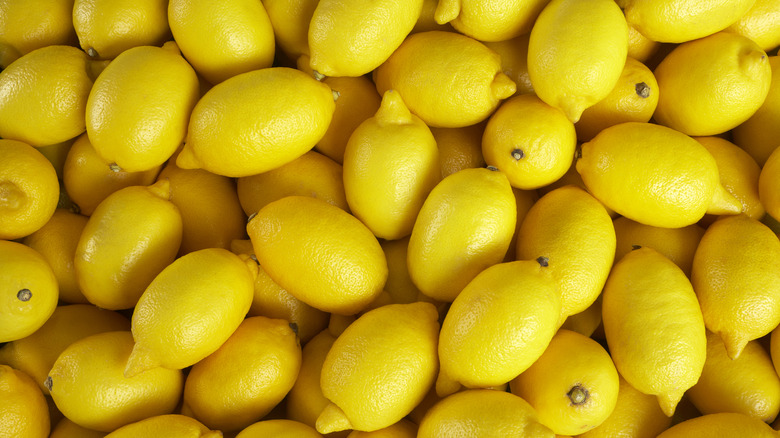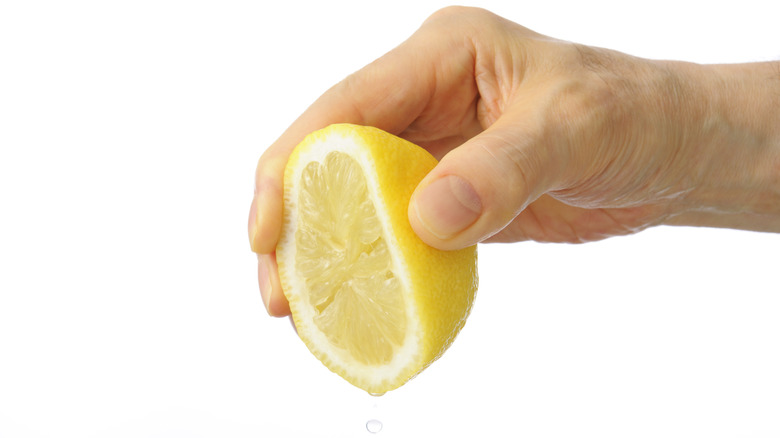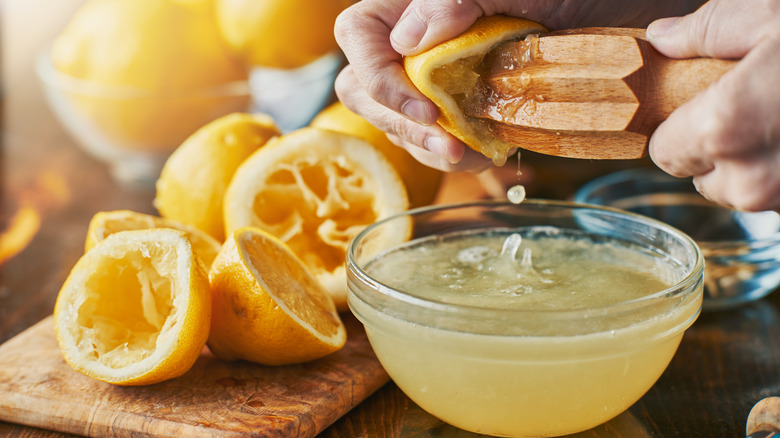Here's The Maximum Amount Of Juice You Can Get From One Lemon
Have you ever read a recipe that asked for a third of a cup of lemon juice and thought, how on earth do I get to that?
Lemon juice is called for in almost every variety of recipe you could think of — sweet, savory, spicy, sour. It's one of the only fruits that would be equally at home in a tart, fish pasta, vodka spritzer cocktail, or even Gordon Ramsay's dessert pizza. But while some recipes allow you to zhuzh a little lemon juice in at your discretion, or call for a straightforward half or whole lemon, others will require you to do a little guestimation.
The problem with measuring lemon juice from whole lemons is that not all lemons are created equal. Lemons of different sizes will, appropriately, produce different amounts of juice. But the maximum amount of juice in one (large) lemon will probably clock in at around five tablespoons. That's not very much, so always buy a couple more lemons than you think you'll need.
How much lemon juice is in a lemon?
Small lemons can yield about two to three tablespoons of juice, while medium lemons will come in around three to four tablespoons. Large lemons, however, will get you the most bang for your buck, producing between four and five tablespoons of lemon juice. If you're being asked to measure in fluid ounces, that would be 1-1.5 fluid ounces for a small lemon, 2 fluid ounces for a medium lemon, and 2.5 fluid ounces for a large lemon.
So if a recipe calls for a quarter cup of lemon juice, that would be about four tablespoons — or one large or medium lemon. If you need a third of a cup, that's just over five tablespoons, so you'd need one large lemon, and probably a little extra. For a half cup, go for two large lemons, and for one whole cup, four large lemons should do the trick.
You can store this juice in the fridge for about three days, or you can freeze lemon juice for up to four months, but it's best used immediately to preserve the freshness of the flavor.
Tips for getting more lemon juice
As long as there have been lemons used in cooking, there have been tricks that various chefs or bartenders use to get the most lemon juice possible from a lemon. To start with, zesting your lemon before you juice it is a surefire way to get more lemon flavor out of your citrus, and a pinch of lemon zest will be equally at home in a salad, pasta dish, or dessert.
If you plan on juicing your lemons, you should store them in the pantry, not the refrigerator, as a cold environment will make them more difficult to juice. Older lemons, just at the edge of going bad, will yield the most juice. If your lemons are getting old and feel squishy to the touch, it's time to juice those bad boys. But there are other tricks as well. For example, microwaving your lemon for twenty seconds can yield an entire extra tablespoon of lemon juice. Many people also roll their lemons on a hard surface for a few seconds to get them loose and juicy. And, of course, using a citrus reamer or citrus press will score you more juice than squeezing by hand.



